
UNav-Sim
Visually Realistic Underwater Robotics Simulator UNav-Sim
Stars: 63
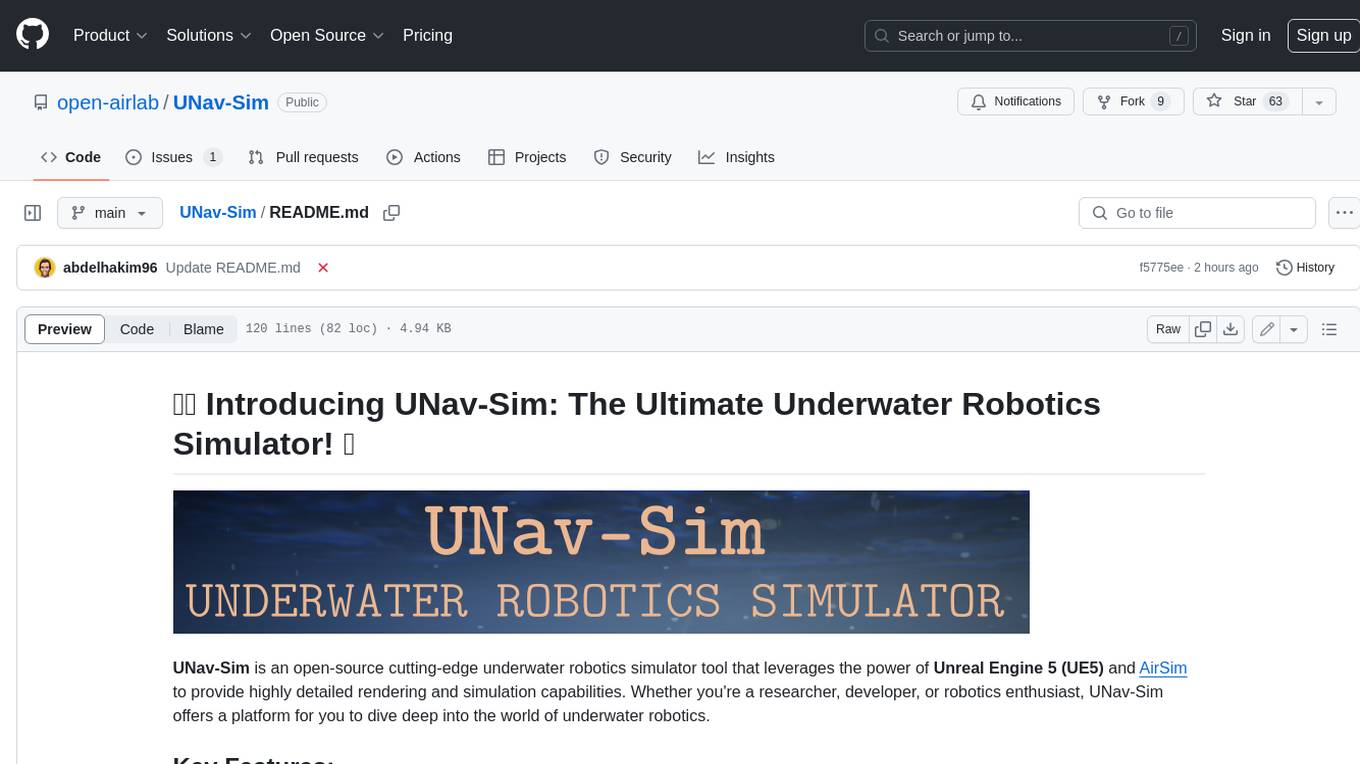
UNav-Sim is an open-source underwater robotics simulator tool that leverages the power of Unreal Engine 5 (UE5) and AirSim to provide highly detailed rendering and simulation capabilities. With UNav-Sim, you can explore underwater terrains, design and test autonomous underwater vehicles (AUVs), and accelerate your learning and experimentation process in the field of underwater robotics.
README:
UNav-Sim is an open-source cutting-edge underwater robotics simulator tool that leverages the power of Unreal Engine 5 (UE5) and AirSim to provide highly detailed rendering and simulation capabilities. Whether you're a researcher, developer, or robotics enthusiast, UNav-Sim offers a platform for you to dive deep into the world of underwater robotics.
- Open-source ✔️
- High-fidelity rendering using Unreal Engine 5 ✔️
- Underwater physics and robot models ✔️
- Works on Linux and Windows OS ✔️
- ROS1 and ROS2 support ✔️
Discover a wide range of possibilities with UNav-Sim, from exploring underwater terrains to designing and testing autonomous underwater vehicles (AUVs). Whether you're a student, researcher, or hobbyist, this powerful tool will accelerate your learning and experimentation process.
3. UNav-Sim ros navigation stack
UNav-Sim relies in Unreal Engine 5 for generating realistic renderings. First, install UE5 and then proceed to install UNav-Sim
-
Make sure you are registered with Epic Games. This is required to get source code access for Unreal Engine.
-
Clone Unreal 5.1 in your favorite folder and build it (this may take a while!)
# go to the folder where you clone GitHub projects
git clone -b 5.1 [email protected]:EpicGames/UnrealEngine.git
cd UnrealEngine
./Setup.sh
./GenerateProjectFiles.sh
makeClone this repo in your favourite folder:
git clone [email protected]:open-airlab/UNav-Sim.git
cd UNav-SimWe provide you scripts to automatically setup and build UNav-Sim:
./setup.sh
./build.sh
# use ./build.sh --debug to build in debug modeTroubleshooting: If you're installing UNav-Sim from Ubuntu 22, then instead of vulkan-utils you will need to install vulkan-tools:
sudo apt update
sudo apt install vulkan-toolscd ~/UNav-Sim/Unreal/Environments/Blocks
right-click on Blocks.uproject, select Unreal Engine Generate Project Files- Add the settings.json file to C:\Users[username]\Documents\AirSim
- open the project using your IDE
- Run and debug using Launch BlocksEditor(DebugGame)....
If you use this framework in your work, please cite the following paper:Link to paper
@inproceedings{amer2023unav,
title={UNav-Sim: A Visually Realistic Underwater Robotics Simulator and Synthetic Data-generation Framework},
author={Amer, Abdelhakim and {\'A}lvarez-Tu{\~n}{\'o}n, Olaya and U{\u{g}}urlu, Halil {\.I}brahim and Sejersen, Jonas Le Fevre and Brodskiy, Yury and Kayacan, Erdal},
booktitle={2023 21st International Conference on Advanced Robotics (ICAR)},
pages={570--576},
year={2023},
organization={IEEE}
}Thank you for using this project! 🌟
For Tasks:
Click tags to check more tools for each tasksFor Jobs:
Alternative AI tools for UNav-Sim
Similar Open Source Tools

UNav-Sim
UNav-Sim is an open-source underwater robotics simulator tool that leverages the power of Unreal Engine 5 (UE5) and AirSim to provide highly detailed rendering and simulation capabilities. With UNav-Sim, you can explore underwater terrains, design and test autonomous underwater vehicles (AUVs), and accelerate your learning and experimentation process in the field of underwater robotics.
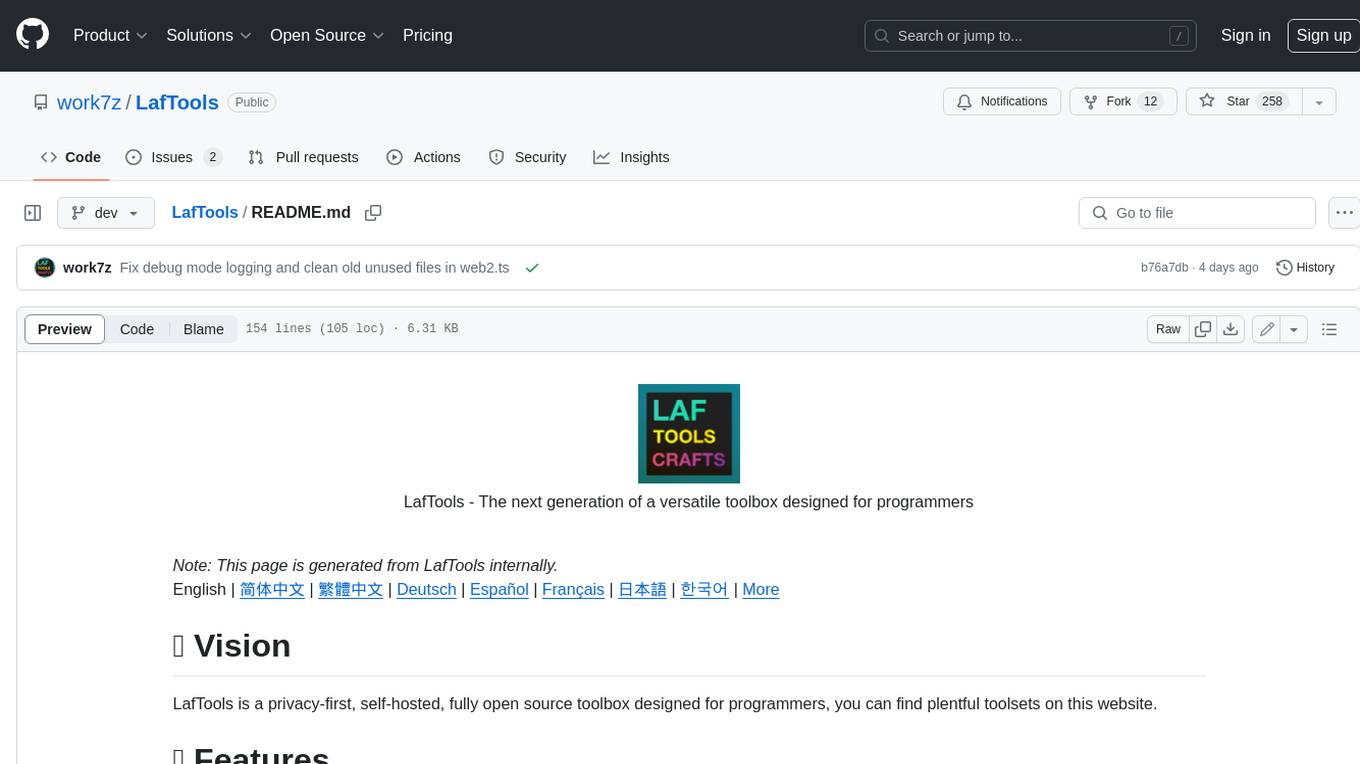
LafTools
LafTools is a privacy-first, self-hosted, fully open source toolbox designed for programmers. It offers a wide range of tools, including code generation, translation, encryption, compression, data analysis, and more. LafTools is highly integrated with a productive UI and supports full GPT-alike functionality. It is available as Docker images and portable edition, with desktop edition support planned for the future.
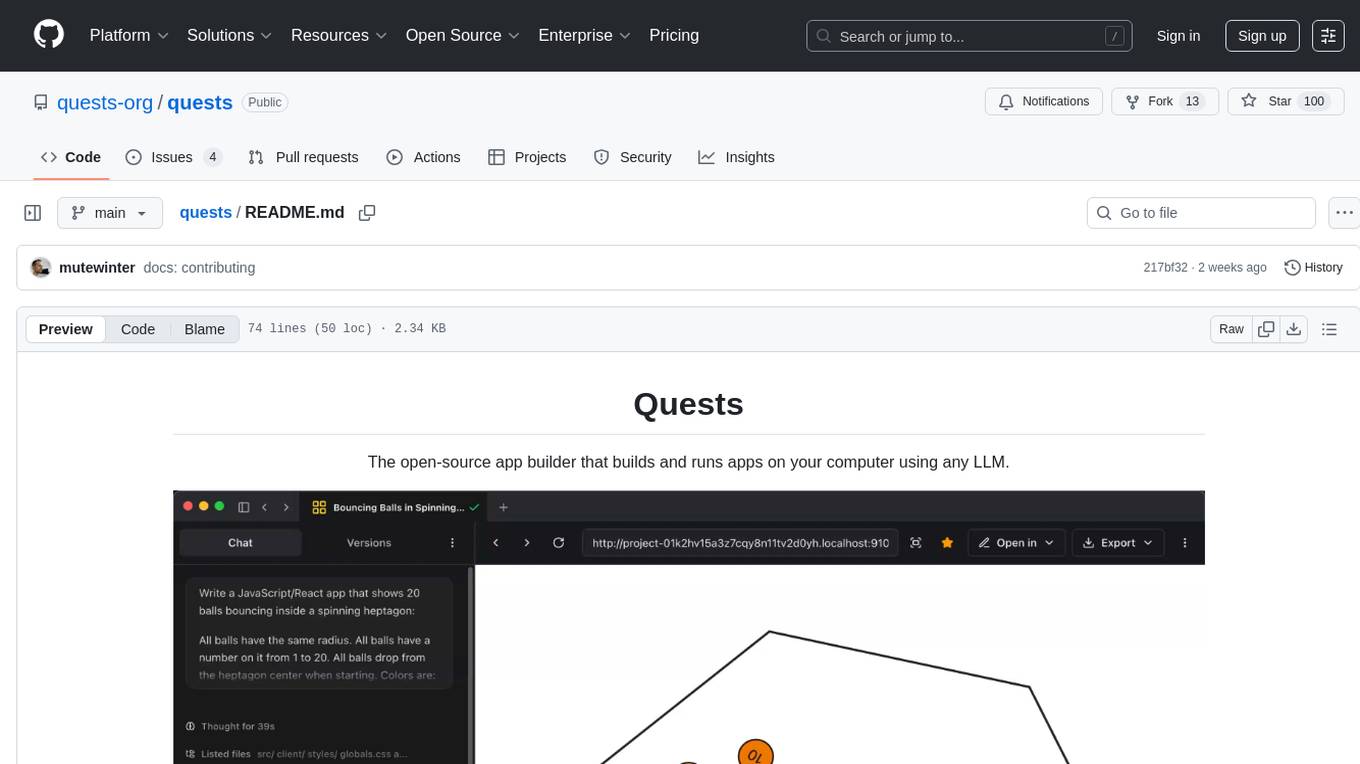
quests
Quests is an open-source app builder that allows users to build and run apps on their computer using various AI models. It provides a desktop app for local development, supports multiple projects simultaneously, offers version control, and enables exportable apps. Users can bring their own AI models from providers like OpenAI, Anthropic, Google, etc. The tool also includes a coding agent for targeted edits and real-time linting, making it suitable for developers looking to leverage AI in their app development workflow.
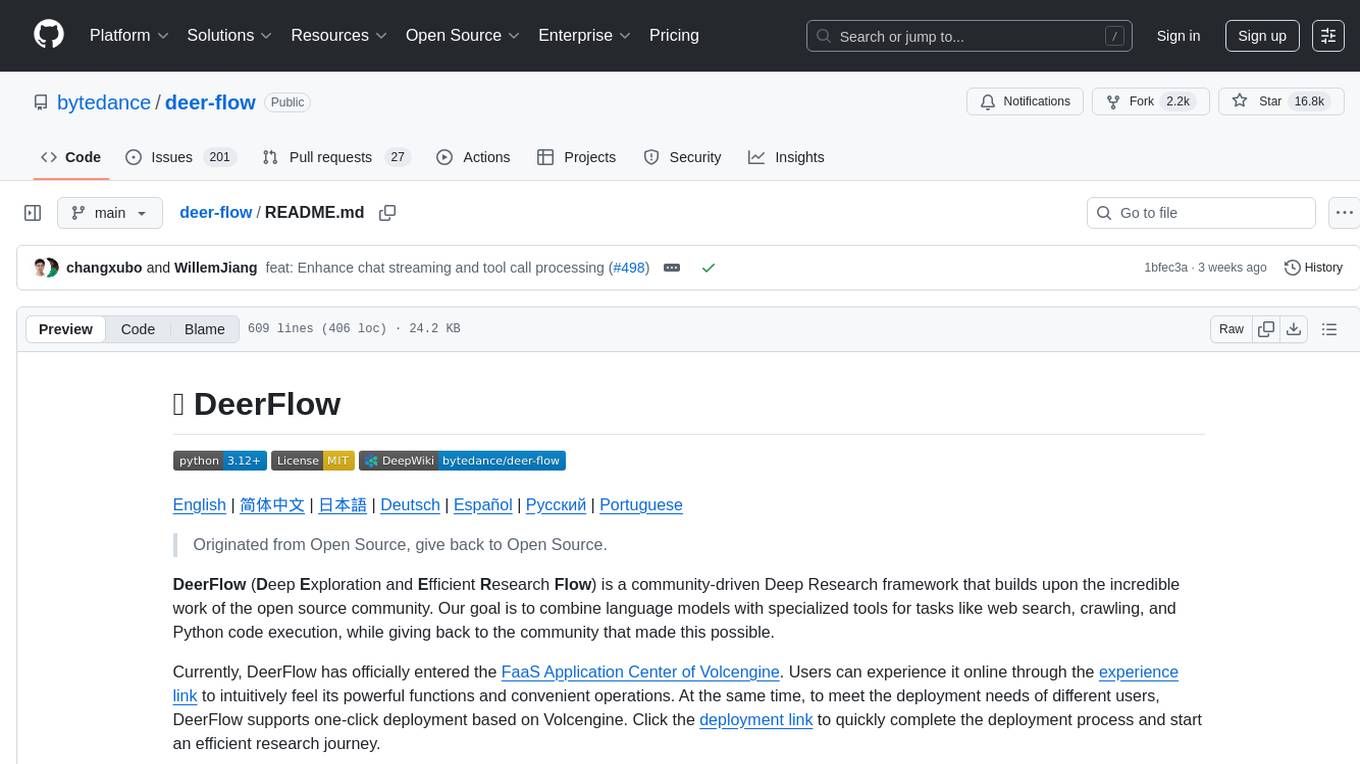
deer-flow
DeerFlow is a community-driven Deep Research framework that combines language models with specialized tools for tasks like web search, crawling, and Python code execution. It supports FaaS deployment and one-click deployment based on Volcengine. The framework includes core capabilities like LLM integration, search and retrieval, RAG integration, MCP seamless integration, human collaboration, report post-editing, and content creation. The architecture is based on a modular multi-agent system with components like Coordinator, Planner, Research Team, and Text-to-Speech integration. DeerFlow also supports interactive mode, human-in-the-loop mechanism, and command-line arguments for customization.
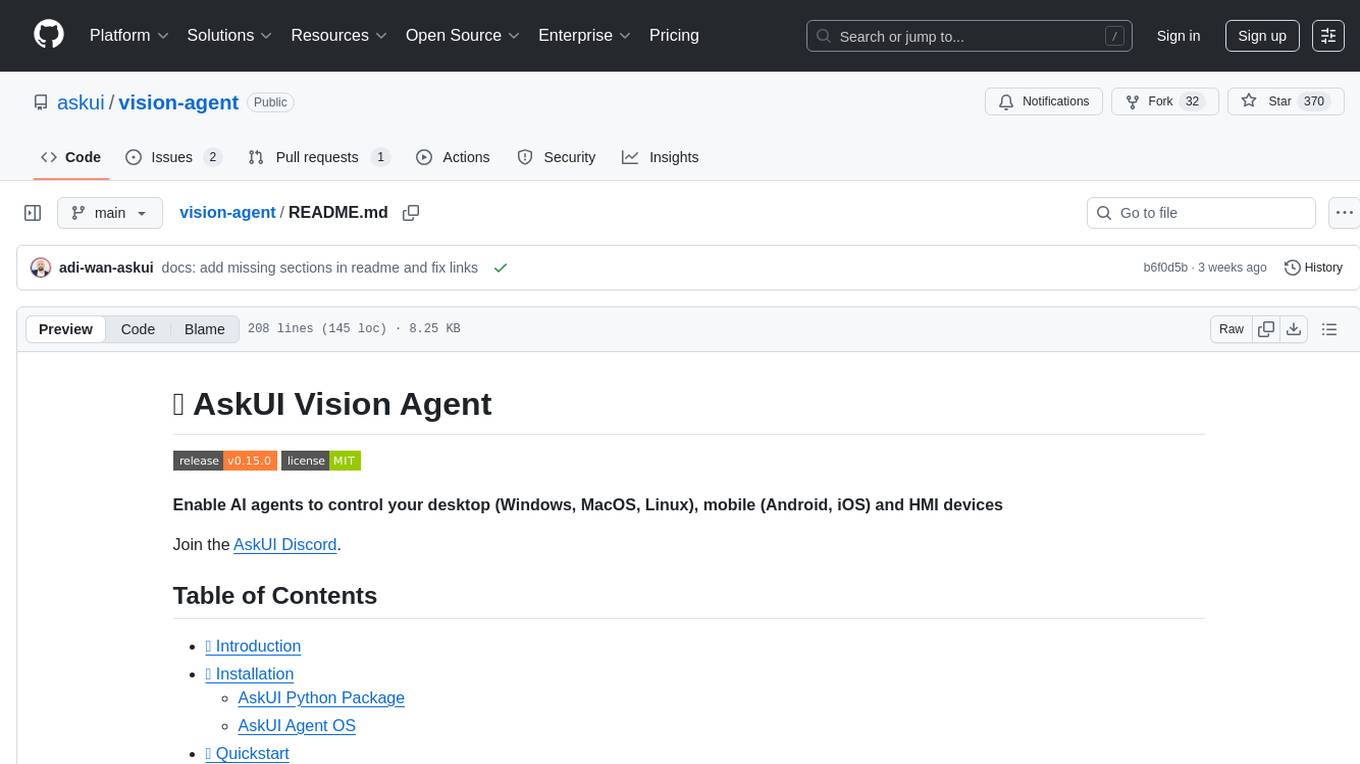
vision-agent
AskUI Vision Agent is a powerful automation framework that enables you and AI agents to control your desktop, mobile, and HMI devices and automate tasks. It supports multiple AI models, multi-platform compatibility, and enterprise-ready features. The tool provides support for Windows, Linux, MacOS, Android, and iOS device automation, single-step UI automation commands, in-background automation on Windows machines, flexible model use, and secure deployment of agents in enterprise environments.
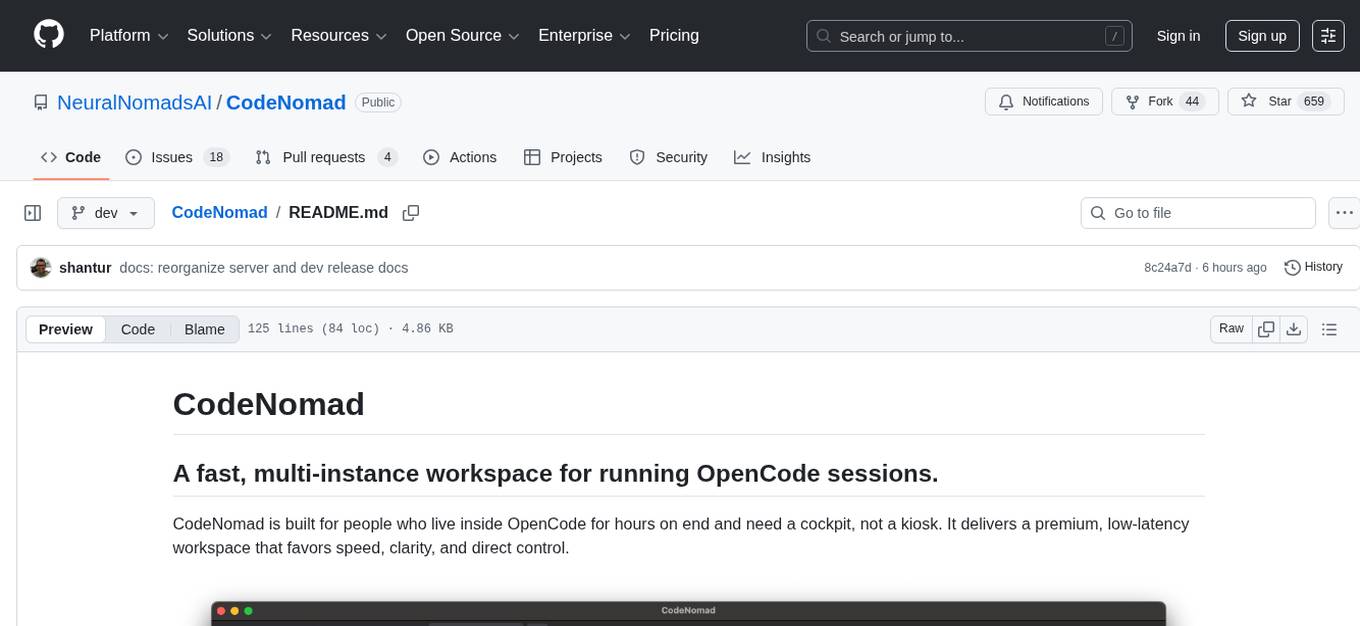
CodeNomad
CodeNomad is a fast, multi-instance workspace designed for users who spend extended hours in OpenCode. It provides a premium, low-latency environment with features like managing multiple OpenCode sessions side-by-side, global command palette for keyboard-first control, rich media previews, and browser support via CodeNomad Server. Users can choose between a Desktop App (Electron-based) with global shortcuts and deeper system integration, a Tauri App for lightweight high-performance experience, or run CodeNomad as a local server accessed via web browser. The tool supports multi-instance workspace, long-session native scrolling, command palette for easy navigation, and deep task awareness to monitor background tasks and child sessions without interruptions.
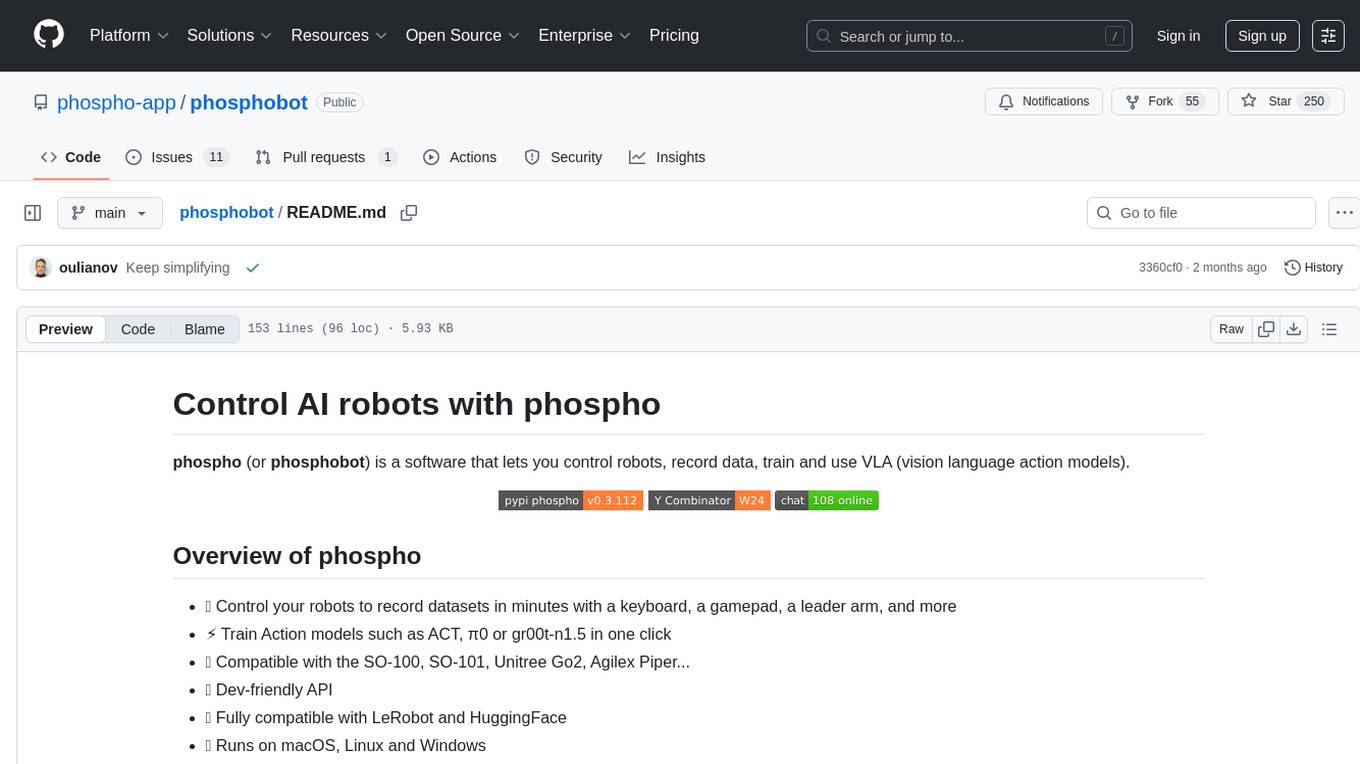
phosphobot
Phosphobot is a software tool designed to control robots, record data, train and use VLA (vision language action) models. It allows users to control robots using various input methods, train action models with ease, and is compatible with a range of robots and cameras. The tool runs on multiple operating systems and provides a user-friendly API for developers. Users can purchase a starter pack or use supported robots, record datasets, train action models, and control robots using the webapp or Python package. Phosphobot is open source, allowing users to extend its functionality with their own robots and cameras.
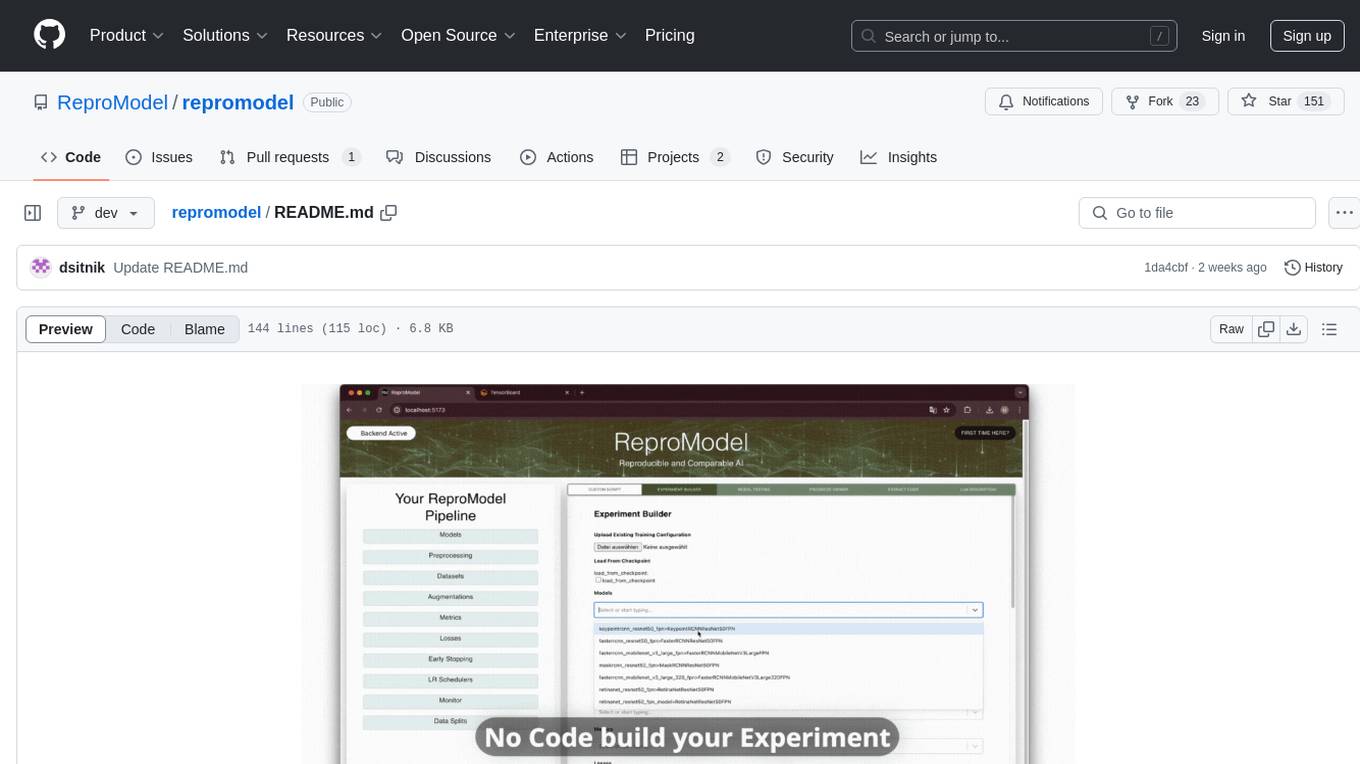
repromodel
ReproModel is an open-source toolbox designed to boost AI research efficiency by enabling researchers to reproduce, compare, train, and test AI models faster. It provides standardized models, dataloaders, and processing procedures, allowing researchers to focus on new datasets and model development. With a no-code solution, users can access benchmark and SOTA models and datasets, utilize training visualizations, extract code for publication, and leverage an LLM-powered automated methodology description writer. The toolbox helps researchers modularize development, compare pipeline performance reproducibly, and reduce time for model development, computation, and writing. Future versions aim to facilitate building upon state-of-the-art research by loading previously published study IDs with verified code, experiments, and results stored in the system.
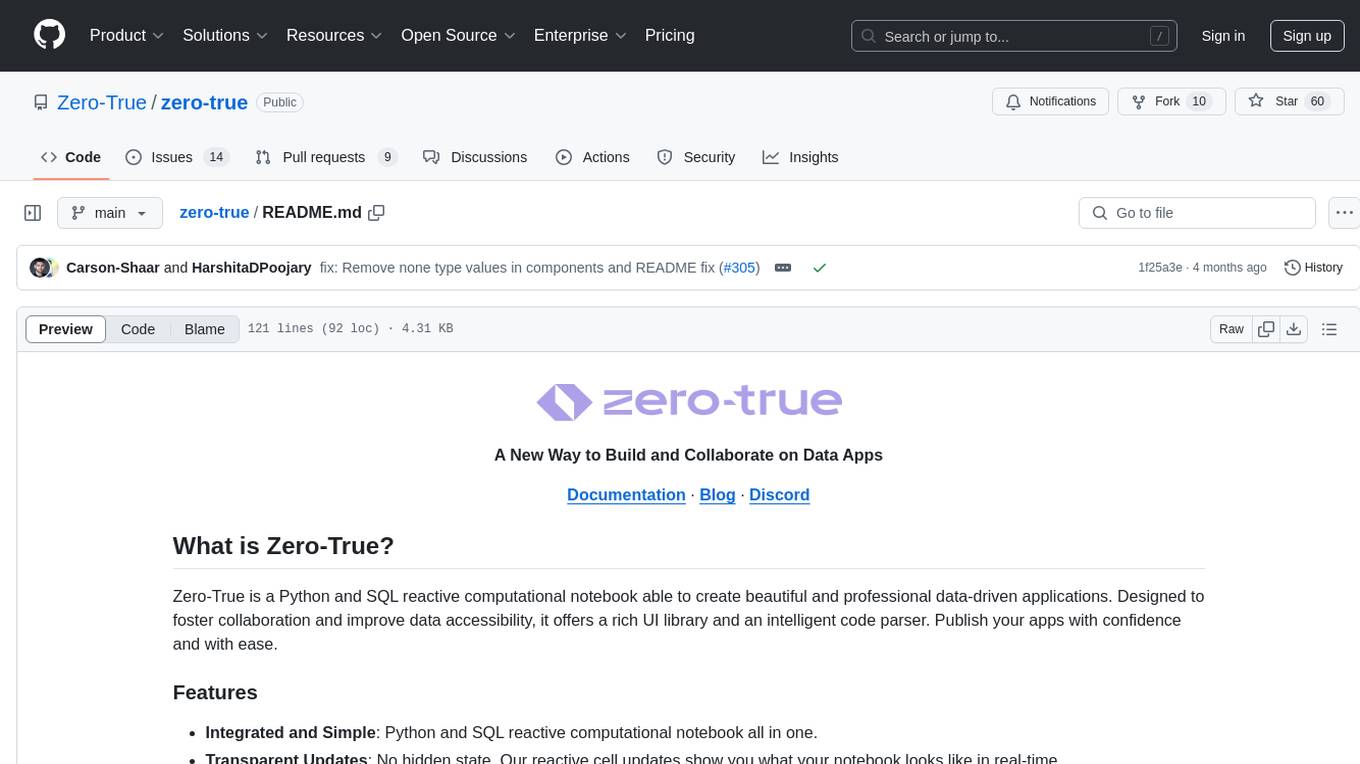
zero-true
Zero-True is a Python and SQL reactive computational notebook designed for building and collaborating on data-driven applications. It offers an integrated and simple environment with transparent updates, dynamic and interactive UI rendering, fast prototyping capabilities, and open-source community contributions. Users can create rich, reactive apps with ease and publish them confidently. Zero-True aims to improve data accessibility and foster collaboration among users.

plandex
Plandex is an open source, terminal-based AI coding engine designed for complex tasks. It uses long-running agents to break up large tasks into smaller subtasks, helping users work through backlogs, navigate unfamiliar technologies, and save time on repetitive tasks. Plandex supports various AI models, including OpenAI, Anthropic Claude, Google Gemini, and more. It allows users to manage context efficiently in the terminal, experiment with different approaches using branches, and review changes before applying them. The tool is platform-independent and runs from a single binary with no dependencies.
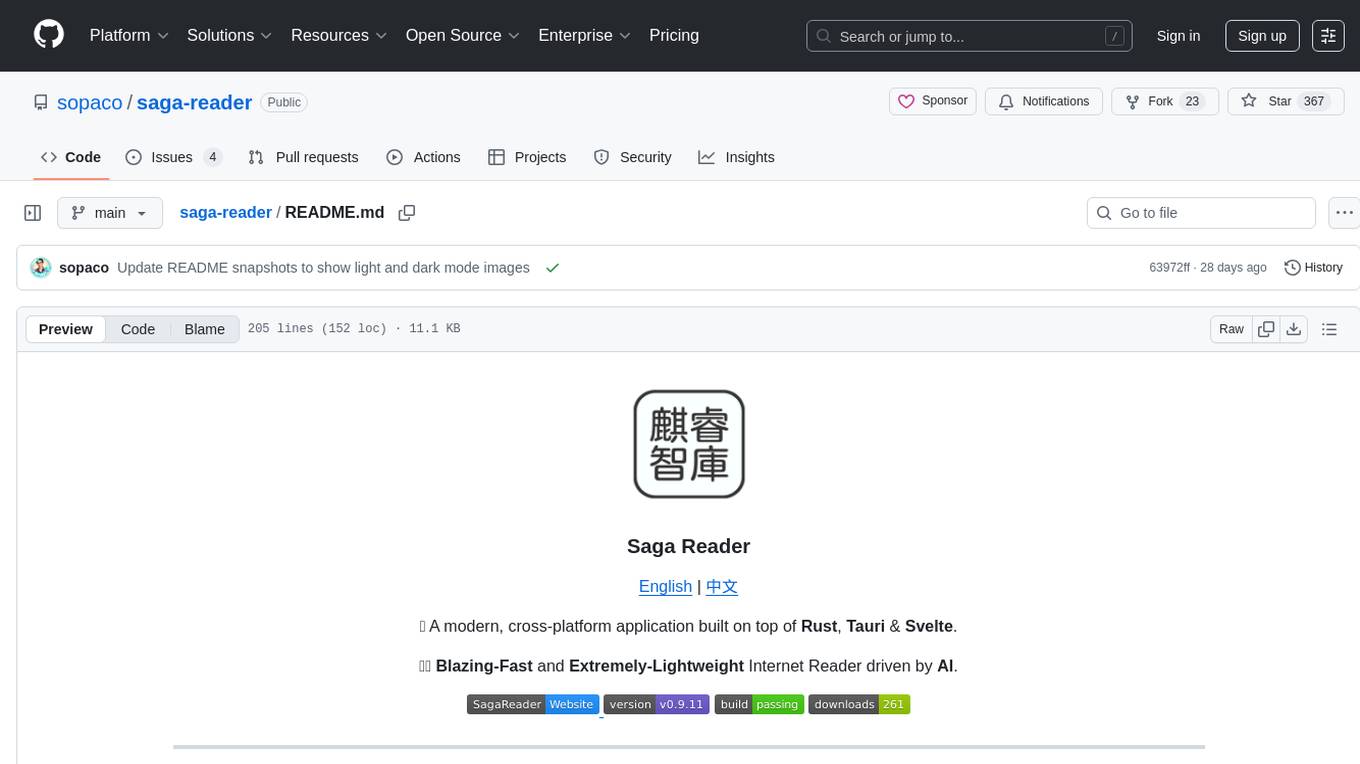
saga-reader
Saga Reader is an AI-driven think tank-style reader that automatically retrieves information from the internet based on user-specified topics and preferences. It uses cloud or local large models to summarize and provide guidance, and it includes an AI-driven interactive companion reading function, allowing you to discuss and exchange ideas with AI about the content you've read. Saga Reader is completely free and open-source, meaning all data is securely stored on your own computer and is not controlled by third-party service providers. Additionally, you can manage your subscription keywords based on your interests and preferences without being disturbed by advertisements and commercialized content.

DevoxxGenieIDEAPlugin
Devoxx Genie is a Java-based IntelliJ IDEA plugin that integrates with local and cloud-based LLM providers to aid in reviewing, testing, and explaining project code. It supports features like code highlighting, chat conversations, and adding files/code snippets to context. Users can modify REST endpoints and LLM parameters in settings, including support for cloud-based LLMs. The plugin requires IntelliJ version 2023.3.4 and JDK 17. Building and publishing the plugin is done using Gradle tasks. Users can select an LLM provider, choose code, and use commands like review, explain, or generate unit tests for code analysis.
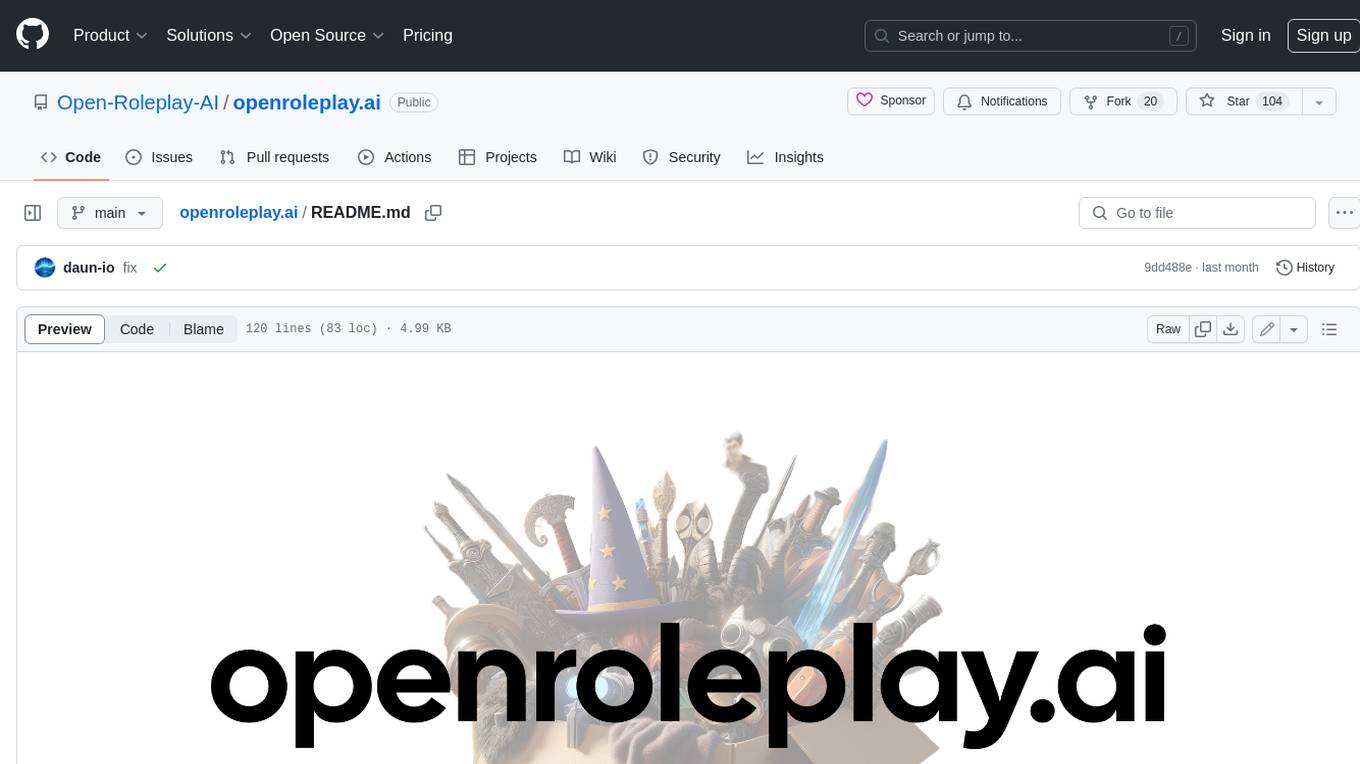
openroleplay.ai
Open Roleplay is an open-source alternative to Character.ai. It allows users to create their own AI characters, customize them, and generate images and voices for them. Open Roleplay also supports group chat and automatic translation. The tool is built with Next.js, React.js, Tailwind CSS, Vercel, Convex, and Clerk.
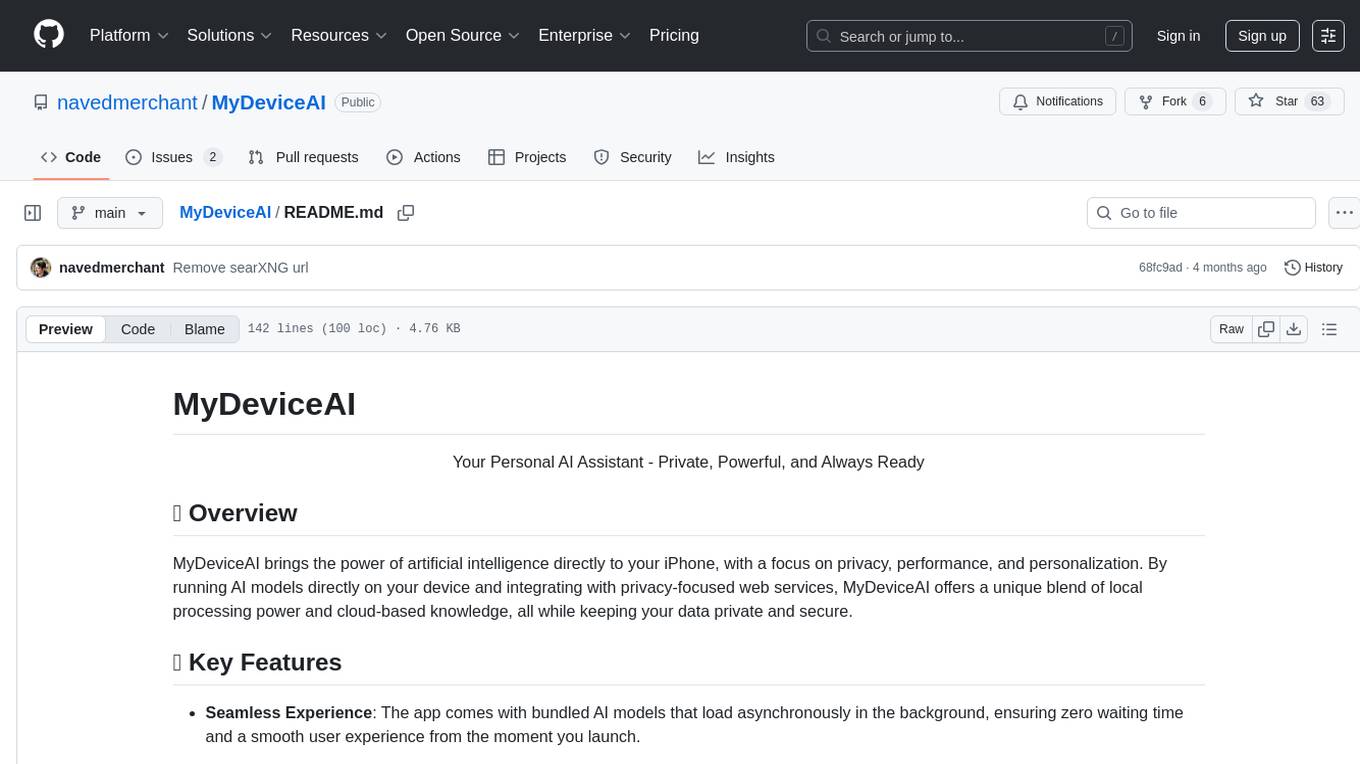
MyDeviceAI
MyDeviceAI is a personal AI assistant app for iPhone that brings the power of artificial intelligence directly to the device. It focuses on privacy, performance, and personalization by running AI models locally and integrating with privacy-focused web services. The app offers seamless user experience, web search integration, advanced reasoning capabilities, personalization features, chat history access, and broad device support. It requires macOS, Xcode, CocoaPods, Node.js, and a React Native development environment for installation. The technical stack includes React Native framework, AI models like Qwen 3 and BGE Small, SearXNG integration, Redux for state management, AsyncStorage for storage, Lucide for UI components, and tools like ESLint and Prettier for code quality.
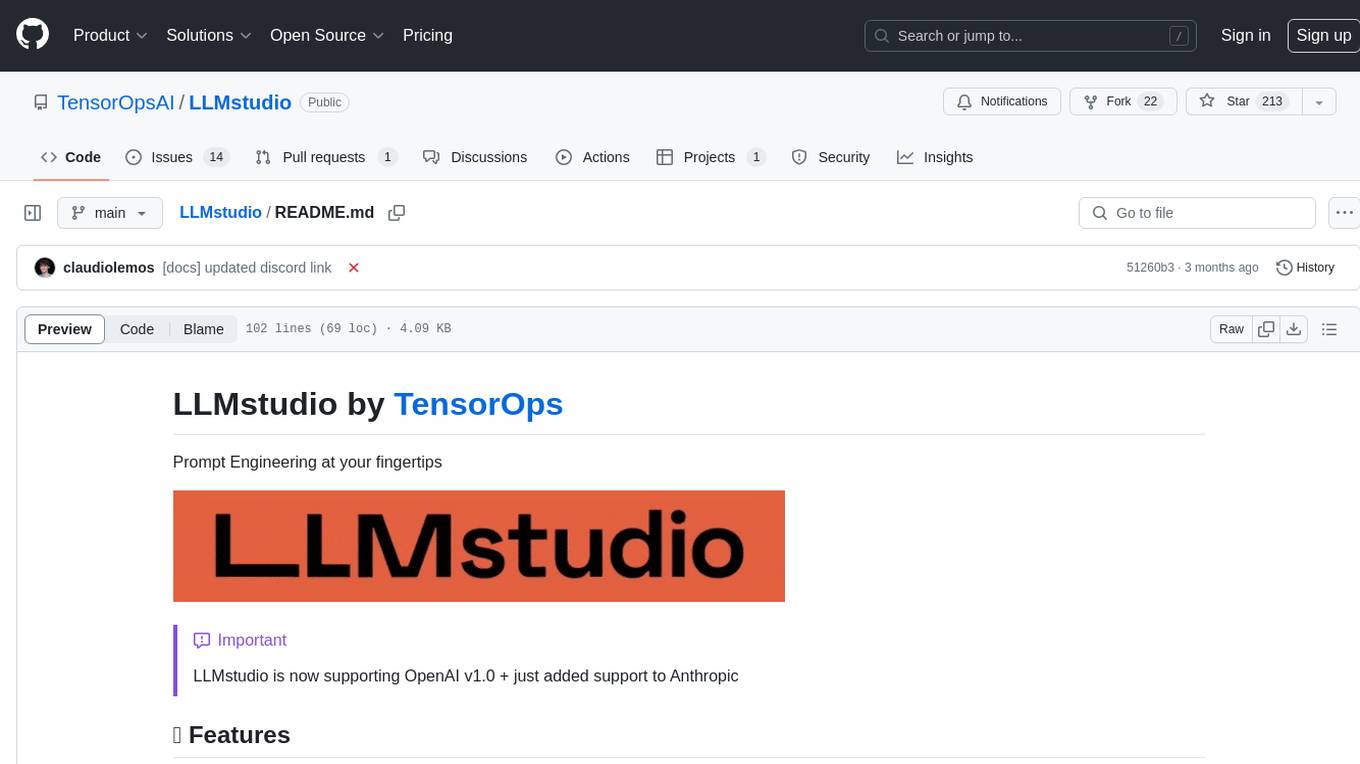
LLMstudio
LLMstudio by TensorOps is a platform that offers prompt engineering tools for accessing models from providers like OpenAI, VertexAI, and Bedrock. It provides features such as Python Client Gateway, Prompt Editing UI, History Management, and Context Limit Adaptability. Users can track past runs, log costs and latency, and export history to CSV. The tool also supports automatic switching to larger-context models when needed. Coming soon features include side-by-side comparison of LLMs, automated testing, API key administration, project organization, and resilience against rate limits. LLMstudio aims to streamline prompt engineering, provide execution history tracking, and enable effortless data export, offering an evolving environment for teams to experiment with advanced language models.

gptme
Personal AI assistant/agent in your terminal, with tools for using the terminal, running code, editing files, browsing the web, using vision, and more. A great coding agent that is general-purpose to assist in all kinds of knowledge work, from a simple but powerful CLI. An unconstrained local alternative to ChatGPT with 'Code Interpreter', Cursor Agent, etc. Not limited by lack of software, internet access, timeouts, or privacy concerns if using local models.
For similar tasks

UNav-Sim
UNav-Sim is an open-source underwater robotics simulator tool that leverages the power of Unreal Engine 5 (UE5) and AirSim to provide highly detailed rendering and simulation capabilities. With UNav-Sim, you can explore underwater terrains, design and test autonomous underwater vehicles (AUVs), and accelerate your learning and experimentation process in the field of underwater robotics.
For similar jobs
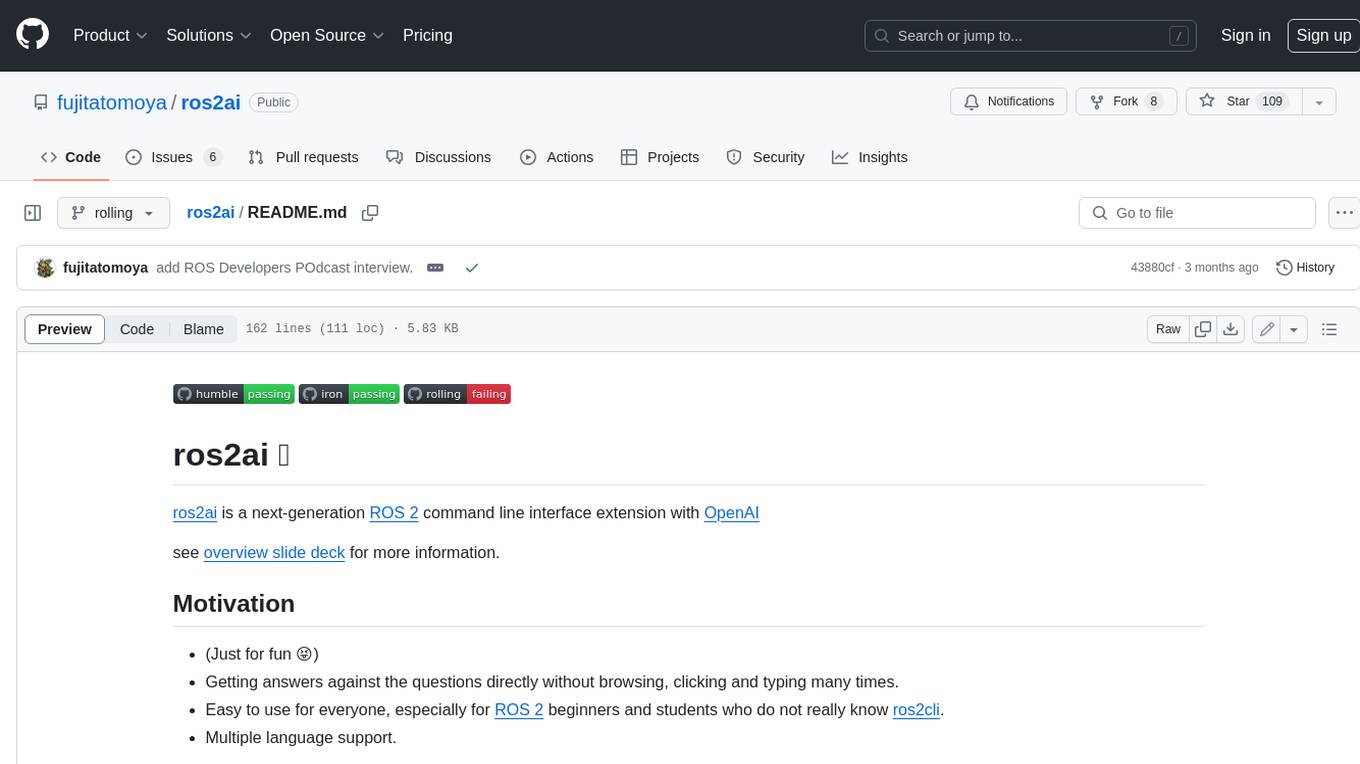
ros2ai
ros2ai is a next-generation ROS 2 command line interface extension with OpenAI. It allows users to ask questions about ROS 2, get answers, and execute commands using natural language. ros2ai is easy to use, especially for ROS 2 beginners and students who do not really know ros2cli. It supports multiple languages and is available as a Docker container or can be built from source.

UNav-Sim
UNav-Sim is an open-source underwater robotics simulator tool that leverages the power of Unreal Engine 5 (UE5) and AirSim to provide highly detailed rendering and simulation capabilities. With UNav-Sim, you can explore underwater terrains, design and test autonomous underwater vehicles (AUVs), and accelerate your learning and experimentation process in the field of underwater robotics.
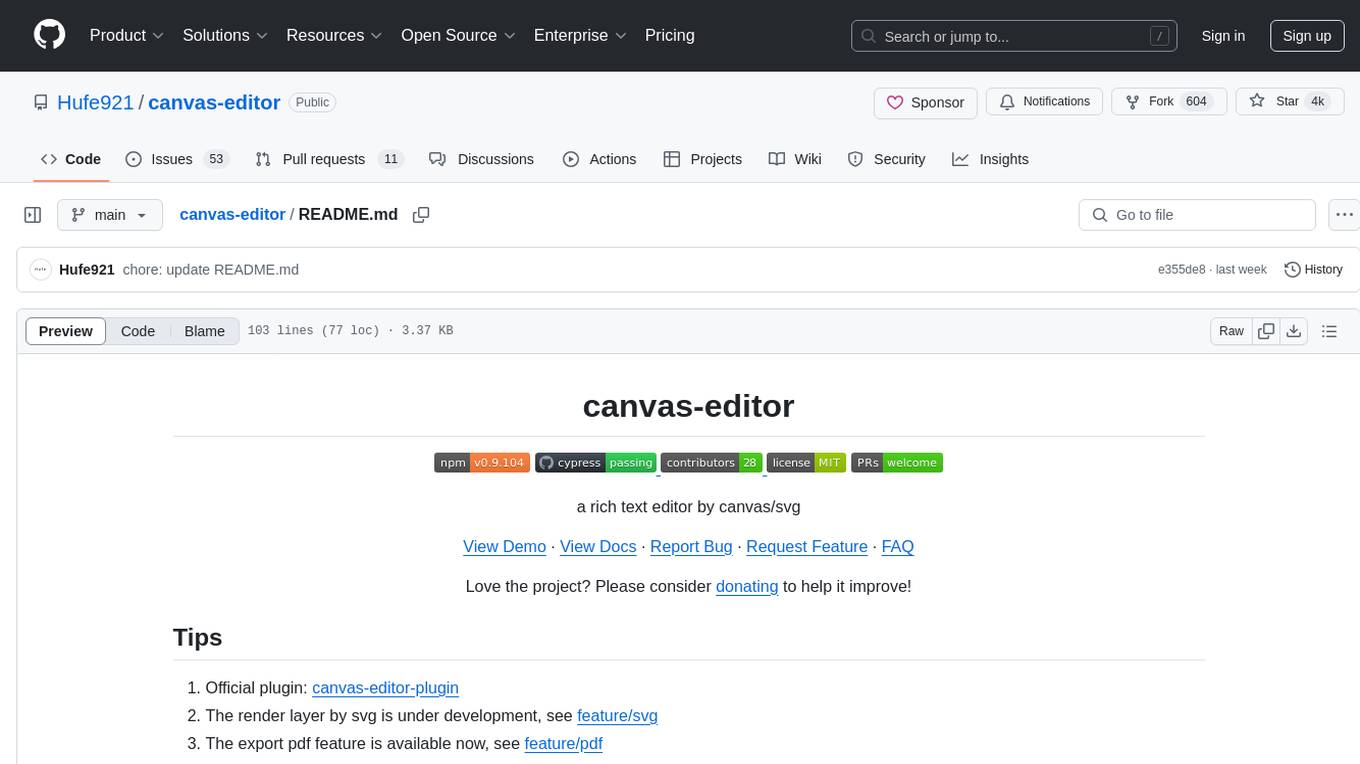
canvas-editor
Canvas Editor is a web-based tool that allows users to create and edit images and graphics directly in the browser. It provides a user-friendly interface with features such as drawing tools, shapes, text editing, and image manipulation. Users can easily customize their designs and export them in various formats. The tool is suitable for graphic designers, web developers, artists, educators, and hobbyists who need a simple yet powerful tool for creating visual content.
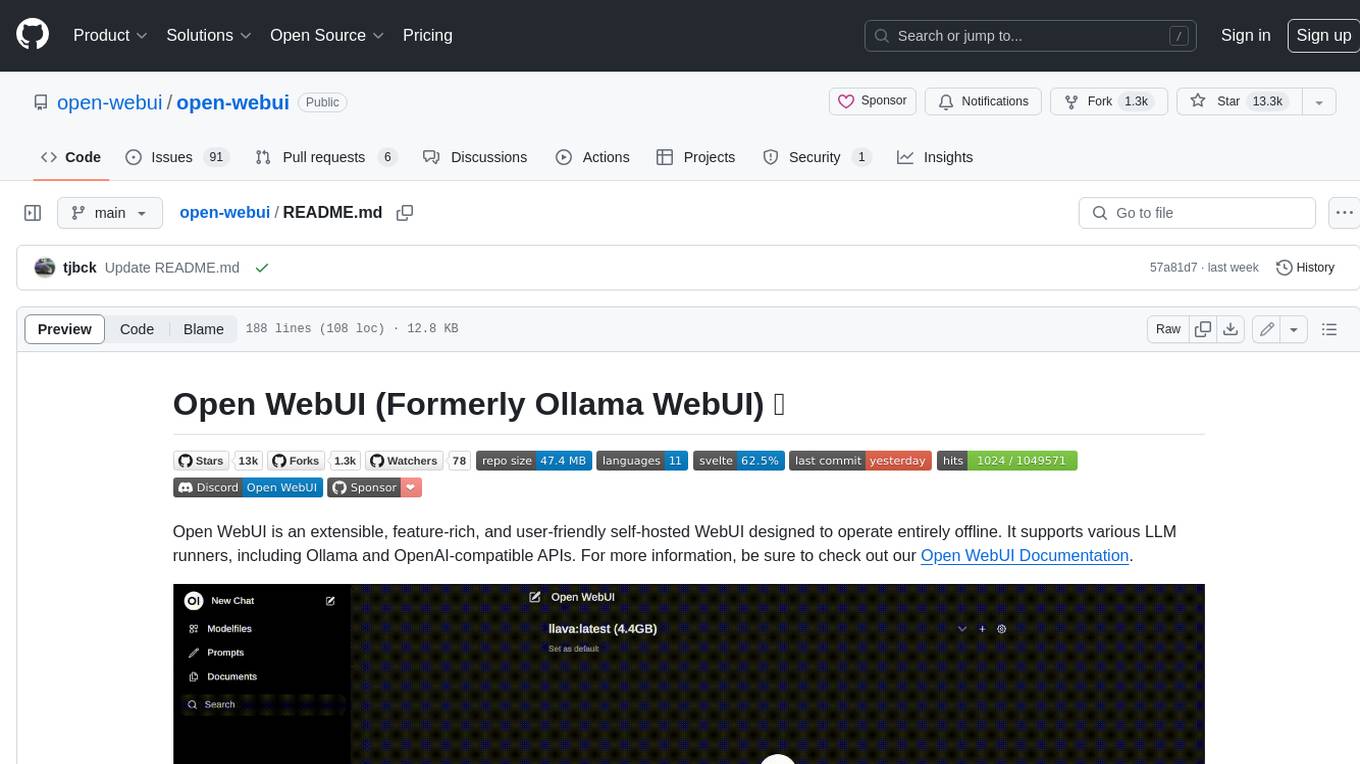
open-webui
Open WebUI is an extensible, feature-rich, and user-friendly self-hosted WebUI designed to operate entirely offline. It supports various LLM runners, including Ollama and OpenAI-compatible APIs. For more information, be sure to check out our Open WebUI Documentation.
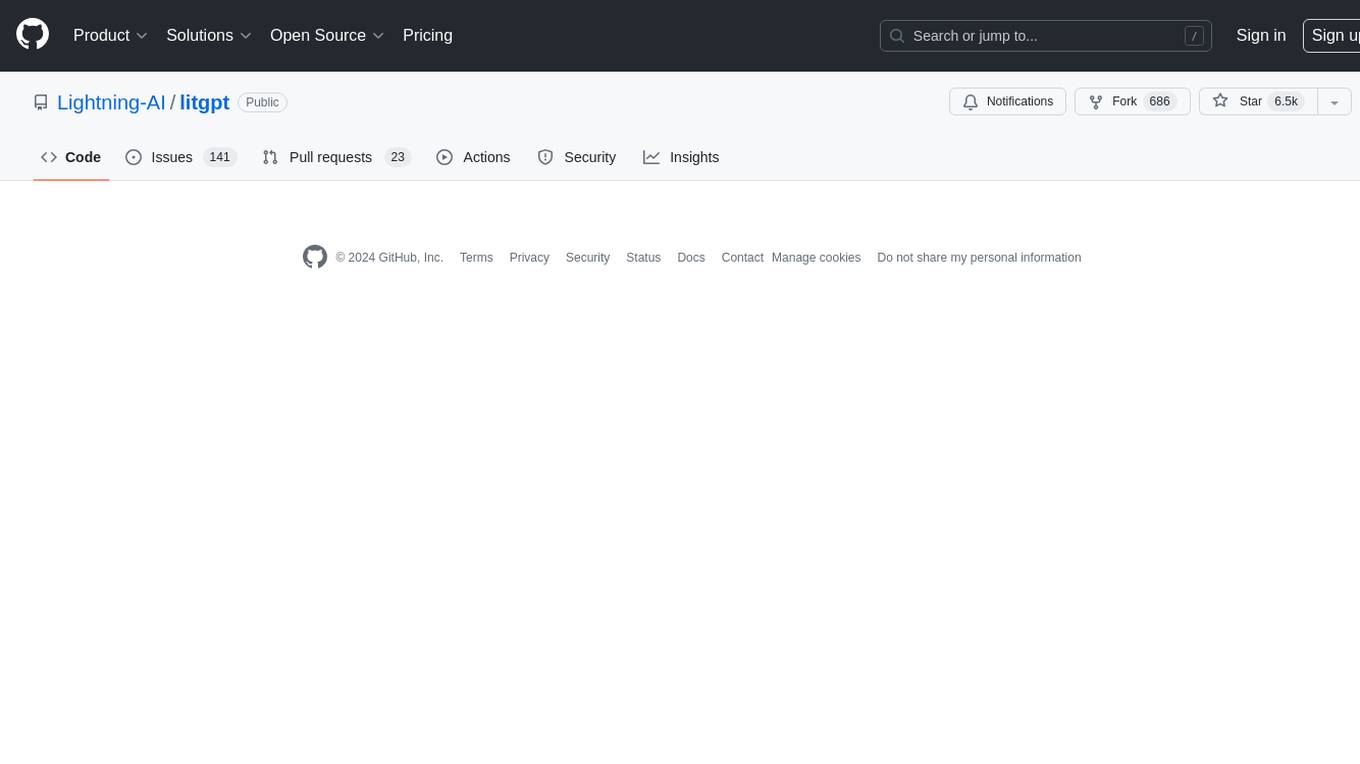
litgpt
LitGPT is a command-line tool designed to easily finetune, pretrain, evaluate, and deploy 20+ LLMs **on your own data**. It features highly-optimized training recipes for the world's most powerful open-source large-language-models (LLMs).

khoj
Khoj is an open-source, personal AI assistant that extends your capabilities by creating always-available AI agents. You can share your notes and documents to extend your digital brain, and your AI agents have access to the internet, allowing you to incorporate real-time information. Khoj is accessible on Desktop, Emacs, Obsidian, Web, and Whatsapp, and you can share PDF, markdown, org-mode, notion files, and GitHub repositories. You'll get fast, accurate semantic search on top of your docs, and your agents can create deeply personal images and understand your speech. Khoj is self-hostable and always will be.
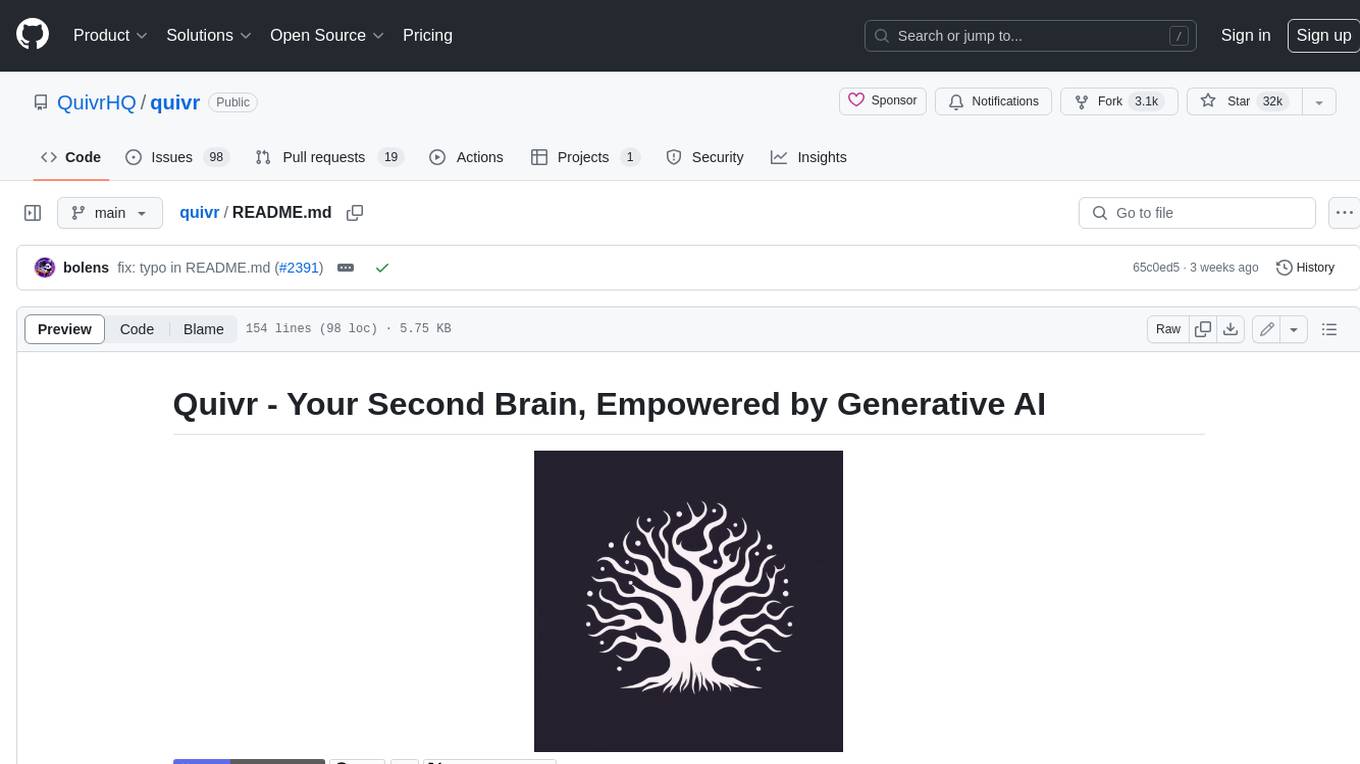
quivr
Quivr is a personal assistant powered by Generative AI, designed to be a second brain for users. It offers fast and efficient access to data, ensuring security and compatibility with various file formats. Quivr is open source and free to use, allowing users to share their brains publicly or keep them private. The marketplace feature enables users to share and utilize brains created by others, boosting productivity. Quivr's offline mode provides anytime, anywhere access to data. Key features include speed, security, OS compatibility, file compatibility, open source nature, public/private sharing options, a marketplace, and offline mode.
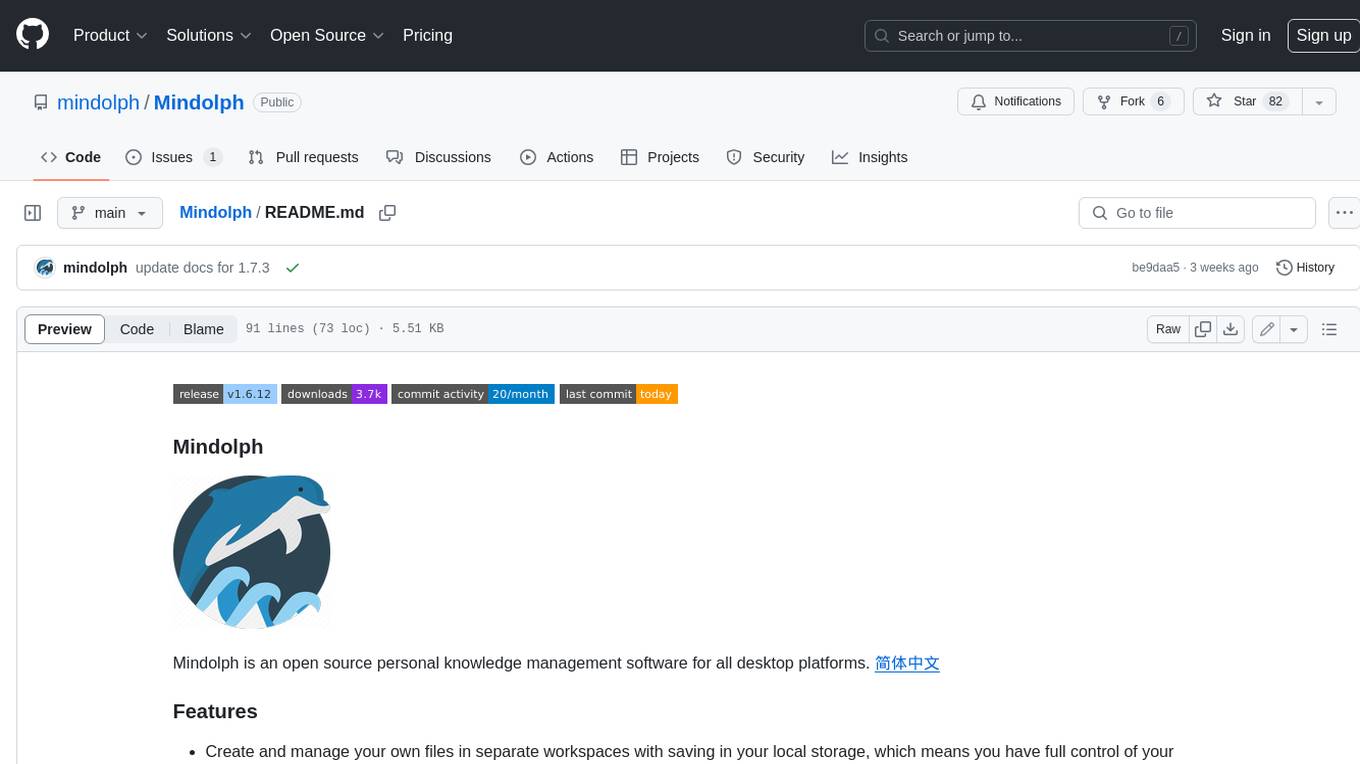
Mindolph
Mindolph is an open source personal knowledge management software for all desktop platforms. It allows users to create and manage their own files in separate workspaces with saving in their local storage, organize their files as a tree in their workspaces, and have multiple tabs for opening files instead of a single file window. Mindolph supports Mind Map, Markdown, PlantUML, CSV sheet, and plain text file formats. It also has features such as quickly navigating to files and searching text in files under a specific folder, editing mind maps easily and quickly with key shortcuts, supporting themes and providing some pre-defined themes, importing from other mind map formats, and exporting to other file formats.
